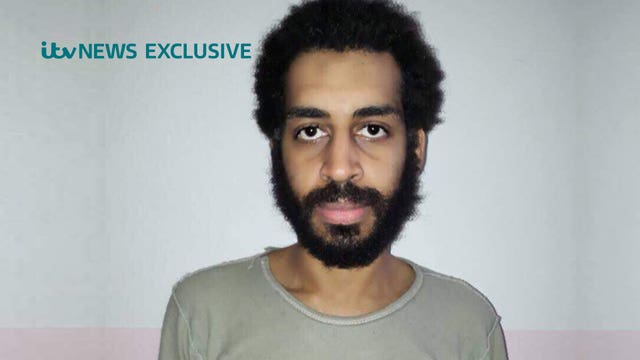
The Home Secretary feared “outrage” from the Trump administration if he sought assurances over avoiding the death penalty for two suspected Islamic State terrorists.
High Court judges heard Sajid Javid believed there was a risk of angering “key US political appointees” if he asked for a guarantee that Alexanda Kotey and El Shafee Elsheikh will not be executed.
The pair are said to have been members of a brutal four-man cell of IS executioners in Syria and Iraq, nicknamed The Beatles because of their British accents, responsible for a killing a number of high-profile Western captives.
Details of Mr Javid’s decision were outlined on Monday during a legal challenge by Elsheikh’s mother, Maha Elgizouli, over the UK’s sharing of information with US authorities without obtaining any assurance they will not face execution if convicted in the US.
Edward Fitzgerald QC, for Ms Elgizouli, said Mr Javid was advised that a request for a death penalty assurance would “provoke something close to outrage” among US politicians including Attorney General Jeff Sessions and Defence Secretary James Mattis.
The barrister said the UK’s ambassador to the US, Sir Kim Darroch, advised that “they will wind up the President and he will hold a grudge”.
In a letter to then-Foreign Secretary Boris Johnson in June, Mr Javid said his concern was that any such outrage could result in the men being taken to Guantanamo Bay – beyond the reach of a criminal prosecution.
Kotey and Elsheikh are said to have been members of the cell believed to have also included Mohammed Emwazi – known as “Jihadi John” – who was killed in a US air strike in 2015, and Aine Davis, who has been jailed in Turkey.
The cell is suspected of involvement in the beheading of 27 people, including British aid workers David Haines and Alan Henning and US citizens James Foley, Steven Sotloff and Peter Kassig.
Emwazi was filmed carrying out a number of the murders and the videos were broadcast online.
James Eadie QC, for Mr Javid, told the court: “This group is associated with some of the gravest offences perpetrated against civilians in Syria during the conflict.

“These beheadings are notorious globally, all but one having been filmed and posted on the internet.
“The families of those affected have suffered greatly through the manner of their deaths and are known to support international efforts to bring this group to justice.”
Kotey and Elsheikh, who were raised in the UK, are believed to have been detained by Kurdish forces in Syria in January and have since been stripped of their British citizenship.
They face a federal trial in the US after the Crown Prosecution Service (CPS) decided there was “insufficient evidence” for them to be tried in the UK.
Ms Elgizouli says the sharing of information and material with the US authorities under a “mutual legal assistance” (MLA) agreement, without seeking assurances the suspects will not face execution if extradited and tried there, was “unlawful”.
Mr Fitzgerald said her legal team is “in the dark” as to the nature of the material requested by the US, but that it includes 600 witness statements gathered by the Metropolitan Police’s counter terrorism command.
He also said it was not known why the CPS decided there was not enough evidence to prosecute and that the stance of US officials was that the pair should be tried in the UK.
He told the court Mr Javid “made no attempt” to seek assurances at all and made his “unprecedented and unjustified” decision against advice from officials.
“We say this country should not facilitate the imposition in another country of a punishment which we ourselves recognise as inhuman and unlawful,” he said.
The barrister said that, if convicted, the pair would face a lengthy wait on death row, where the average time spent is about 12 years, followed by “experimental and cruel” execution by lethal injection – which in recent executions has caused “prolonged suffering”.
He said it was “relevant” that some family members of those killed have said they want the pair to be tried, but are opposed to the death penalty.
He added: “The claimant has not come before this court to excuse the appalling acts with which her son has been linked, if those acts are proved against him.
“Her concern is the death penalty and she asks that the Government should be held to its general policy and invariable practice of seeking death penalty assurances before providing evidence pursuant to the MLA treaty.”
Lawyers for Mr Javid contend there is no prohibition on providing legal assistance to another country in circumstances where it may result in proceedings leading to the death penalty.
After Elsheikh’s mother launched legal action, the Home Office announced in July that it had agreed to a “short-term pause” of the MLA process with the US.
Prime Minister Theresa May supported Mr Javid’s original decision, which was also backed by Boris Johnson when he was Foreign Secretary.
But the MLA sparked widespread criticism in Westminster from across the political divide.
The hearing before the Lord Chief Justice Lord Burnett and Mr Justice Garnham continues on Tuesday.


Comments: Our rules
We want our comments to be a lively and valuable part of our community - a place where readers can debate and engage with the most important local issues. The ability to comment on our stories is a privilege, not a right, however, and that privilege may be withdrawn if it is abused or misused.
Please report any comments that break our rules.
Read the rules hereComments are closed on this article